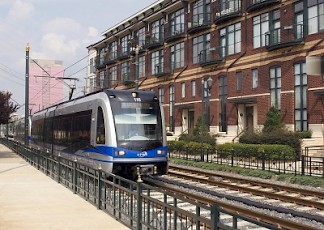Happening Now
Getting to the Conventions: A Tale of Two Cities' Travel Choices
September 11, 2012
Written By Malcolm Kenton
For the last two weeks, the nation's attention has been focused, respectively, on two large Southern cities. Both are modern metropolises that showcased their ability to host a major national event, and consequently, each welcomed many first-time visitors.

While the ease of getting around town was largely not a factor for people in deciding to attend either major political party's nominating convention, the two events highlighted differing infrastructure philosophies being carried out by the two cities.
Charlotte boasts an almost 5-year-old light rail line--the LYNX Blue Line --that allowed those driving to the Democratic Convention to park at one of the park-and-ride lots off of I-485 on the south end of the city and take a 20-minute train ride right into the Time Warner Cable Arena. Tampa'sTECO Line streetcar does connect a park-and-ride lot in the Ybor City neighborhood with the Tampa Bay Times Forum (site of the Republican Convention), but its appearance as a vintage trolley may have made it less appealing to convention-goers. Another factor is that the TECO Line closed the three stops closest to the Times Forum during the convention for security purposes, but LYNX maintained normal service throughout the convention, despite Charlotte's transit hub being a block away from the Time Warner Cable Arena.
The day before the opening gavel of the Democratic Convention (Labor Day), Charlotte hosted Carolina Fest, a large street festival. On that day, 33,000 passengers rode LYNX. It was also reported that Democratic convention organizers were able to carry more people on fewer chartered buses than Republican organizers could, thanks again to LYNX providing much-needed mobility.
Had this been Tampa, attendees would have had to contend with traffic and spend time finding a reasonably close parking spot. A Tampa resident who was there for the convention asked, "Why can't we have something like this in Tampa?"
The answer lies in the diverging paths the citizens of the two cities decided to take. LYNX's 2007 opening was made possible by Mecklenburg County voters' approval of an additional local sales tax to support light rail's construction and operation. Hillsborough County (home to Tampa) voters were presented with a similar measure in November 2010, but they rejected it, with Tea Partiers among the most vocal opponents.
"All big cities have adequate mass transit," Tampa Mayor Pam Iorio (D) told the Tampa Bay Times. "It's the one deficiency that we have. It shows up when we have big events, and it shows up in our daily lives. If we had it for the convention, my guess is, light rail would have connected major activity centers together. People would have used it."
Also worth noting is that, thanks to two decades of commitment and investment by the State of North Carolina, Charlotte enjoys eight daily Amtrak trains, only two of which receive no state support. People coming to Charlotte from Raleigh, Greensboro and other points in the state's Piedmont Corridor had morning, mid-day and evening trains to choose from, and those coming from the Northeast could choose a daytime or overnight train to the Queen City.
For the convention, Florida could have been showcasing the construction of a high-speed rail line from Tampa to Orlando--paralleling the state's heaviest-traveled stretch of highway. But Gov. Rick Scott (R) decided to return the federal money that had been awarded to the project. Tampa is only served by two daily Amtrak trains--the Silver Star route from New York to Miami. Florida does not fund any of its Amtrak service.
The relative hassle and expense that the GOP and its convention participants had to incur in getting to and around Tampa—compared to visitors to Charlotte—will hopefully lead the GOP delegates to rethink their party’s stated opposition to Amtrak fundingand its silence on support for urban transit, and to once again question Gov. Scott's shortsighted decision to deny central Floridians an alternative to crippling traffic congestion.
"I wish to extend my appreciation to members of the Rail Passengers Association for their steadfast advocacy to protect not only the Southwest Chief, but all rail transportation which plays such an important role in our economy and local communities. I look forward to continuing this close partnership, both with America’s rail passengers and our bipartisan group of senators, to ensure a bright future for the Southwest Chief route."
Senator Jerry Moran (R-KS)
April 2, 2019, on receiving the Association's Golden Spike Award for his work to protect the Southwest Chief
Comments